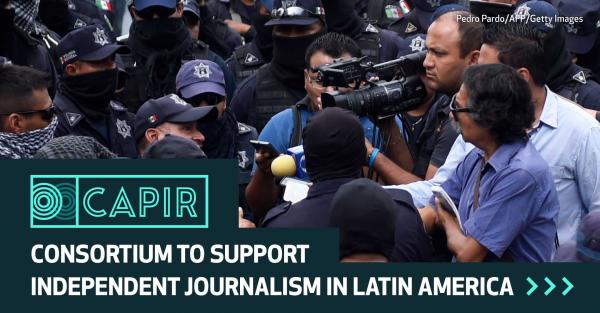Latin America & the Caribbean
IWPR Latin America and the Caribbean currently works across eighteen countries in the region where freedom of expression and access to information are at risk, supporting journalism and building activists’ digital and social media skills.
We strengthen the capacity of journalists and media outlets, from basic reporting to financial sustainability, as well as providing security training and support. IWPR builds links with civil society groups, enhancing communications strategies and supporting cyber activists to build awareness among new generations of freedom of expression and human rights issues.
Regional Consortium to Support Journalism (CAPIR)
IWPR has brought together a consortium of organisations from across Latin America and the Caribbean, to specialise in investigative journalism, improve their media management and audience reach, build security capacity and increase their longer term sustainability.
The CAPIR consortium aims to pilot and implement holistic solutions to emerging challenges and threats to journalism and independent media across the region. The project will help build the conditions that allow journalists to conduct fact-based reporting that informs populations and holds those in power to account. Priority countries have included Mexico, Honduras, El Salvador, Guatemala, Venezuela, Peru and Bolivia. In 2024 the project was expanded to offer support services to the entire region of Latin America, with a focus on investigative reporting.
The project has resulted in many prestigious journalism awards for investigative reporting as well as real life outcomes. These include a number of corrupt officials being removed from their posts, the cancellation of dubious contracts, criminal investigations, as well as proposed legislation and policy reviews aimed to reduce the scope for corruption in the future.
Years active:
- 2020-present
Project focus page:
Areas of work to support journalists include:
- Investigative journalism capacity for national and transfrontier reporting,
- Media audience expansion and financial sustainability,
- Digital, physical, political/legal and psychosocial security capacity, with e-learning tools on the Totem Project.
Consortium partners:
Positive Influence on Social Media: Regional
IWPR’s digital communications and information team works with cyberactivists and online influencers in restrictive environments across Latin America and the Caribbean to help build their capacity to promote positive change through social media.
Through IWPR’s Influencer School, supported content creators learn about human rights, how to increase audience and engagement metrics, improve content quality and deliver targeted campaigns to promote positive social change.
So far, human rights campaigns have focused on promoting democracy and electoral rights, demanding the liberation of political prisoners , reducing poverty, denouncing repression and asserting the right to free expression. Many of the campaigns have gone viral, engaging and raising knowledge of these issues amongst millions of young social media users in the region.
Years Active:
- 2018-present
Bolivia
Political events in Bolivia have deeply polarised society, with the judiciary manipulated by both sides to silence opposition and dissent.
Truly independent, investigative media struggle to gain access to resources, with those critical of the government or private enterprise losing critical advertising funding- meaning many have been forced to close down. During the 2019 electoral crisis, journalists were attacked while covering street protests and strikes.All of this has fostered a climate of self-censorship. Bolivia is a priority country for the CAPIR programme, under which journalists learn investigative reporting, build resilience to security threats, increase the financial capacity to sustain independent media and develop tools and networks to increase their viability.
Years active:
- 2020-present
Project focus page:
Cuba
IWPR has worked with journalists and civil society groups in Cuba since 2011, equipping them with the skills to conduct fact-based reporting, provide objective, unbiased and accurate information about the country, question and hold authority to account and create mutual support networks.
Despite the many challenges of operating in this restrictive environment, a combination of in-person, distance and on-the-job learning has raised the standard of journalistic work. Some participants made such progress that they won international prizes and IWPR was able to recruit them as journalism trainers.
Ongoing project work seeks to build the organisational capacity of news providers and civil society groups, increase their capacity to investigate corruption and crime, conduct watchdog journalism and thus better prepare them to achieve their goals and deliver their messages in a focused, transparent and professional manner.
Years active:
- 2011-present
Related outputs:
Publications:
Honduras
Honduras is one of the most dangerous places in the world to be a journalist or human rights defender. The journalism sector has been prioritised for support under the CAPIR programme.
Journalists learn to conduct investigative reporting, build resilience to security threats, and gain the financial capacity to sustain independent media.
Years active:
- 2016-present
Project focus page:
Mexico
Mexico consistently tops the list of dangerous countries for journalists, with organised crime and corrupt officials threatening the lives of reporters and their families.
It is a priority country for the CAPIR programme, in which journalists learn to conduct investigative reporting, build resilience to security threats and develop the financial capacity to sustain independent media.
Years active:
- 2016-present
Project focus pages:
Nicaragua
A government crackdown against a popular uprising in 2018 led many of Nicaragua’s media outlets and journalists to operate from exile. Journalists have been murdered and jailed, and several independent press, digital and television outlets have been banned, as have the human rights organisations that were created to protect them.
However, Nicaragua’s population continues to turn to independent media as the most credible source for their information. Working with local civil society partners, IWPR provided strategic planning support for media outlets to be able to survive this crisis.
Years active:
- 2016-2019
Venezuela
With its devastating climate for media freedoms, Venezuela is a priority country for the CAPIR programme. Journalists learn to conduct investigative reporting, build resilience to security threats against their lives and wellbeing, develop the financial capacity to sustain independent media and develop tools and networks to provide verified information in the face of pervasive government propaganda.
Years active:
- 2016-present
Project focus pages:

